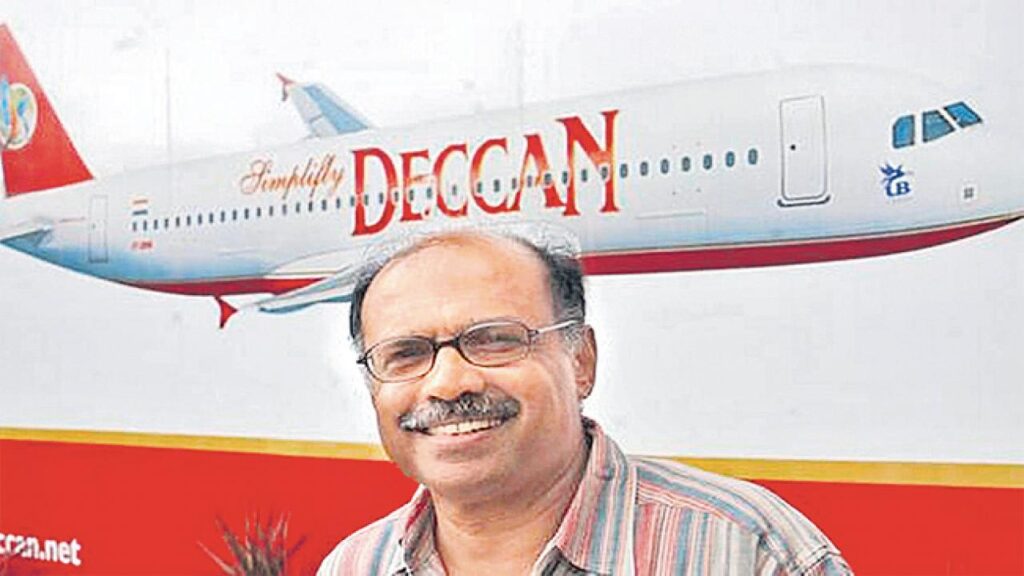Ever wonder why did Deccan Airways fail? We dig deep and provide a comprehensive analysis of the rise and fall of Air Deccan.
In the world of aviation, the stories of success are often accompanied by tales of failure. One such cautionary tale is that of Deccan Airlines, which once held the promise of revolutionizing the Indian aviation industry. In its heyday, Deccan Airways was a symbol of aspiration and progress, a pioneer that aimed to bring affordable air travel to the masses. However, this low-cost carrier’s rapid ascent was followed by an equally swift and tragic fall, leaving the industry and its patrons puzzled about the factors that led to its eventual collapse.
Deccan Airlines’ journey began with an ambitious vision to connect the far-flung corners of India through the skies. Under the leadership of its charismatic founder, Captain G.R. Gopinath, the airline was launched in 2003, armed with a fleet of small aircraft and a strong determination to disrupt the market. Deccan Airlways’ rise was meteoric, capturing the imagination of millions of Indians who had previously never considered flying as an affordable mode of transport.
Explore our podcast
However, Deccan Airlines’ story is a testament to the fact that a rapid rise often paves the way for an equally dramatic fall. The airline faced numerous challenges, from cutthroat competition to operational inefficiencies, which ultimately led to its demise. The story of Deccan Airways is one that is worth examining, not only as a case study in the history of Indian aviation but also as a lesson for future entrepreneurs and business leaders.
In this in-depth analysis, we will explore the 18 key reasons that contributed to the failure of Deccan Airways. By delving into the details of the company’s operations and decision-making, we aim to provide valuable insights for those in the aviation industry, as well as lessons that can be applied to businesses in any sector. Following this examination, we will conclude with a reflection on the broader implications of Deccan Airways’ collapse and the lessons that can be learned from this cautionary tale.
18 Key Reasons for Deccan Airways’ Failure:
- Aggressive Expansion: Deccan Airlines’ rapid growth strategy placed significant strain on its resources. The company quickly expanded its fleet and network, which led to operational challenges and overcapacity in the market.
- Insufficient Market Research: The airline’s expansion into smaller cities was based on an overly optimistic estimation of demand. As a result, many routes were not economically viable, causing losses and underutilized aircraft.
- Inadequate Cost Management: Despite being a low-cost carrier, Deccan Airlines struggled to control costs. High fuel prices, combined with inefficient aircraft utilization, contributed to a weak cost structure.
- Poor Customer Service: Deccan Airlines faced numerous complaints regarding its service quality, including frequent delays, cancellations, and baggage mishandling. This damaged the company’s reputation and customer loyalty.
- Lack of Ancillary Revenue: The airline failed to capitalize on non-ticket revenue sources, such as baggage fees and in-flight services. This further strained the company’s finances.
- Mismanagement of Operations: Deccan Airlines struggled with logistical issues, such as crew scheduling and maintenance, which led to increased operating expenses and reduced efficiency.
- High Employee Turnover: The airline faced difficulties in retaining and motivating its staff, which adversely affected operations and customer service.
- Ineffective Marketing Strategy: Deccan Airlines’ marketing efforts failed to resonate with its target audience, which limited the company’s ability to attract new customers and maintain market share.
- Fierce Competition: The Indian aviation market was, and still is, highly competitive, with both domestic and international players vying for market share. Deccan Airlines struggled to differentiate itself in this crowded space and ultimately succumbed to the competitive pressures.
- Regulatory Challenges: Deccan Airlines faced various regulatory hurdles, such as route approvals and airport slot allocations, which hampered its growth and operational efficiency.
- Lack of a Sustainable Business Model: The airline’s low-cost approach, while initially disruptive, proved to be unsustainable in the long run due to mounting operational costs and an inability to generate sufficient revenue.
- Inefficient Fleet Management: Deccan Airlines operated a diverse fleet of aircraft, which increased maintenance and operational complexities, ultimately driving up costs.
- Fluctuating Oil Prices: The airline’s profitability was heavily impacted by volatile fuel prices, which accounted for a significant portion of its operating expenses.
- Poor Route Planning: Deccan Airlines struggled with optimizing its route network, leading to underutilized aircraft and resources.
- Weak Brand Image: The airline’s brand image suffered due to its numerous operational issues, poor customer service, and the negative perception of being a low-cost carrier.
- Misaligned Management Goals: The management team’s focus on growth and expansion, rather than profitability and efficiency, ultimately hindered the company’s long-term viability.
- Inadequate Financial Management: Deccan Airlines faced financial challenges, such as poor cash flow management and high levels of debt, which limited its ability to invest in its operations and weather difficult market conditions.
- Ill-timed Merger: The airline’s merger with Kingfisher Airlines in 2007 proved to be disastrous, as the combined entity struggled with debt, cultural differences, and operational challenges, ultimately leading to its downfall.
The story of Deccan Airlines serves as a cautionary tale for businesses in any industry. While the company’s ambitious vision and rapid growth initially captured the attention of millions, its operational challenges, management missteps, and competitive pressures ultimately led to its collapse. This case study highlights the importance of maintaining a strong focus on the fundamentals of business, such as cost control, customer satisfaction, and efficient operations.
Moreover, Deccan Airlines’ failure underscores the need for businesses to adapt and evolve in the face of a rapidly changing market. The company’s inability to pivot its business model and address the various challenges it faced ultimately sealed its fate. Entrepreneurs and business leaders should use this example as a reminder to continuously reassess their strategies and adapt to the changing needs of their customers and the market.
In conclusion, the rise and fall of Deccan Airlines offer valuable lessons for businesses across industries. By examining the various factors that contributed to the airline’s failure, we can glean insights into the complexities of running a successful enterprise and the importance of agility and adaptability in today’s business landscape. As we continue to navigate the ever-evolving world of commerce, the story of Deccan Airlines serves as a powerful reminder of the need for prudent decision-making, effective management, and a relentless focus on the customer.
Follow Startup Theater on Instagram for valuable content on entrepreneurship
If you’re a startup founder, submit your startup story for free with us
Did you know? Startups like to use our coworking space in Bangalore
Call +917090977222 to reserve your space at Work Theater
Learn more about our coworking space on our YouTube channel Work Theater Studios where we talk about a variety of topics including personal finance, entrepreneurship, business and life.





1 thought on “Why Did Deccan Airways Fail? The Rise and Fall of Deccan Airways”
For the reason that the admin of tthis web site is working, no hesitation very quickly it
will bee well-known, due to its quality contents.